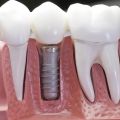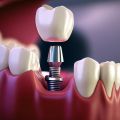How Strong Are Dental Implants Compared To Natural Teeth?

Your teeth are usually extremely strong, but with time, normal wear and tear, gum disease, and cavities weaken the teeth and their structure. This might result in severely damaged or even missing teeth. According to dentists who perform restorative dentistry procedures, dental implants are more robust than natural teeth. They also appear and feel natural; a qualified dentist will ensure a flawless fit.
When your natural teeth begin to show symptoms of wear and tear or are missing, dental implants are the next best option.
So, how strong are dental implants compared to natural teeth?
1. Dental implants are made to last.
Our teeth were designed to last, but poor oral hygiene, stress, and diets high in sugary foods and beverages mean this is only sometimes the case. People of all ages are increasingly vulnerable to tooth decay and gum disease, which can lead to decaying or missing teeth.
Tooth implants repair someone's smile by replacing missing teeth and preventing future damage. The implant consists of a post that acts as the tooth's root, an abutment (connecting piece), and a dental crown or fake tooth.
The screw-in post and connecting piece comprise titanium, one of the strongest metals available. It also does not rust and is biocompatible; thus, the human body is unlikely to reject it.
After the dental implant is placed, the jawbone heals around the post, making it sturdy, if not stronger, than natural teeth.
2. They do not decay.
Natural teeth, unlike implants, can develop cavities, deteriorate, and eventually fall out. Titanium implants do not, which is why doctors frequently recommend them to restore smiles and replace broken teeth.
However, they may become contaminated if you do not keep your implants bacteria-free. Even if you have superhuman new teeth, you must brush, floss, rinse with mouthwash, and see your dentist periodically.
3. It is almost impossible to crack or break an implant.
We say "almost" because the post and abutment portions are unbreakable; the crowns can shatter, much like your natural teeth. Crowns, like natural teeth, can wear down due to excessive teeth grinding or bruxism, general wear and tear, biting your nails, or chewing on ice.
Simply said, part of your dental implant is considerably stronger than your natural teeth, but not the porcelain crown. It can crack and chip, become worn out, and even fall out.
How Strong Are Dental Implants?
Are dental implants as robust as natural teeth? They're stronger.
Many factors determine the strength of dental implants, the most important of which is your jawbone. Titanium seldom, if ever, breaks. Titanium metal is more durable than a tooth. Implants can break, but not on their own. However, if they do not properly fuse to your jawbone, they can cause serious complications.
However, factors such as trauma might cause a dental implant to fail. Your abutment, crown, and jaw are typically affected when an implant fractures. Teeth can also break under high loads.
If there is a high chance of a strong implant, you will likely be a good candidate for dental implants. Your dentist may examine your bone to see if a bone graft will help. If this is the case, you will need a bone transplant followed by a three to six-month waiting period to ensure that the bone fuses before you can receive your implant and crown.
Contact the dental implant center for consultation if you want to replace a missing or damaged tooth with a dental implant.
Other articles and publications:
Articles and publications of other companies:
- +1 (646) 270-9836
- Long Island City
- grantny.com












